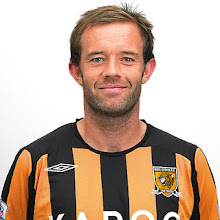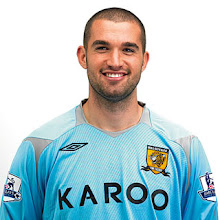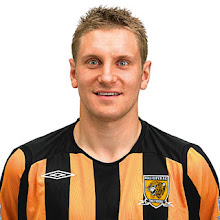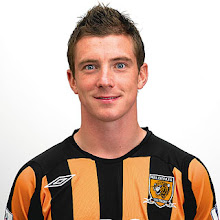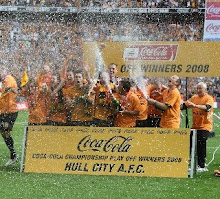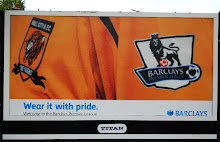
It feels like we're worthy of the Premier League again. A fifth straight defeat it may have been, but any downcast feelings in recent weeks can be tossed aside after a fine performance which, with a little more luck and some less wayward officiating, could have garnered a valuable point.
Arsenal are absolutely superb. What an utter joy it was to view this team at the KC Stadium, qualifiable by the manner in which the Tigers went at them. It resulted in a sometimes exceptional game of football. City emerged with nothing but pride, and pride can go some way if it can be converted into similar performances in the more winnable games on the horizon.
Phil Brown left a collection of big guns on the bench and picked a 4-5-1 which handed a full debut to
Kevin Kilbane at left back, though ultimately the temporary defensive shortages will ease and Kilbane will be cast as the new left-sided midfielder after another disappointing display from
Peter Halmosi. With only
Michael Turner available among the credible choices for central defence,
Sam Ricketts shifted across to play alongside him and
Nathan Doyle, pleasingly, started at right back. Meanwhile,
Ryan France was finally presented with his moment of history, completing the quartet of players to have represented the Tigers in all four divisions of the game, and deservedly so after a steady turnout
at Newcastle in the Cup, aided also by the lack of clout proffered by the players ahead of him in the pecking order.
With the air reassuringly chilled and the TV cameras getting in everyone's way, the game got going. Instantly City forced a pair of corners.
Geovanni whipped in each with pace and bite and Manuel Almunia, somehow not perceived as the most awe-inspiring goalkeeper for such a major footballing force, caught the second as
Daniel Cousin gave him shoulder-led hell. Memories of Arsenal's early season profligacy at set-pieces were instantly recalled, though it's worth pointing out that since Cousin flicked in
City's winner at the Emirates in September, they haven't conceded such a goal since.
Quickly, the multiply begloved Arsenal began to settle down. The passing was magnificent - simple at face value but the space they found against a City side determined to afford them none was an exercise in pass-and-move interplay which the best sides have always endorsed and practised. In Samir Nasri they have a fulcrum, a ticker, a player capable of going anywhere with the ball and turning up somewhere else when without it. These individuals are all blessed, of course, but given their multi-nationalism, in a country represented by so few within their squad (and none on the KC pitch, as Theo Walcott is still crocked), their level of communication and spirit is nothing but admirable.
City began less calmly, electing to try the 100mph approach while the Gunners were still familiarising themselves with new surroundings. Doyle intercepted Denilson's pass and found room to test Almunia from 25 yards, but the ball was too low and visible to trouble the keeper and he collected.
Arsenal's first chance came when a shove on Robin Van Persie - what a player this fellow is - allowed the Dutchman to hit a venomous free kick which spun off the wall's edge and bounced no more than a foot wide of
Boaz Myhill's post with the City custodian scrambling. Van Persie's influence was obvious throughout, and his first touch and exceptional vision - as well as a completely savage left foot - reminded everyone why, even in defeat, the Premier League is such a tremendous place to be.
If Arsenal were going to be matched in ny way, it would be through commitment. This is the trait which Arsène Wenger claimed was missing from his charges when the Tigers turned his and the Premier League's world upside down. Such levels of commitment against a talented, clever side are rather labour-intensive, with the likes of France and
Ian Ashbee spending a greater percentage of their pitch-time than normal merely chasing, closing down and reducing options for the opposition, rather than getting their toes on the ball. For this brand of unflinching donkey work, both can be commended.
Cousin sliced a shot high, wide and handsome after his initial effort from Geovanni's pass rebounded back to him, then the Brazilian delivered a curling, exploring free kick which Almunia held well as Cousin and Turner came in for scraps.
Good stuff from City. The chances weren't clear as day, but the build-ups were restricing Arsenal's capacity to dominate possession and for as long as the Gunners didn't have the ball, the feeling that something was gettable from a fascinating first half increased. Then Arsenal went down the other end, hit the woodwork, and then scored.
This is why the Premier League is as frustrating as it is exciting. The lesser teams in encounters like these can have all the possession and half-chances they like, but if one doesn't go in, you can bet any of your major financial investments that your distinguished opponents will punish you.
Ashbee conceded a free kick in Van Persie territory, and the Dutchman's brutal curling drive was fingernailed, fabulously, by Myhill on to the underside of the bar. A corner is frantically conceded, which Van Persie swings in and Emmanuel Adebayor heads home, unchallenged and unworried.
After such terrific effort and industry, to concede a soft goal from a set-piece will leave Brown raging. Who was meant to restrict Adebayor's leaping potential is unclear, but maybe this is the main risk one takes when only one specialist central defender is selectable. Adebayor, as both a goalscorer and a tall chap, should have been the priority target for extra-zealous marking but in the end he climbed freely to bury the header.
Arsenal then concoted a superb move involving Denilson, Nasri and Adebayor which left City's rearguard seeking its own bearings, but gratifyingly, the less cultured Emmanuel Eboué - not the favourite with the Arsenal faithful - was the player applying the finishing touch and he scooped the ball wide and looked very daft indeed.
Half time, and despite the scoreline and the irritating airheadedness of the defending which allowed it to be scored, there was a marked improvement in City's performance and a noticeable optimism around the KC concourses. The Tigers needed a little more up front, where Cousin was doing his usual chase-everything, reach-little shtick which makes the lamer brains within the Tiger Nation claim he is idle.
Bernard Mendy, playing in his kamikaze wide right role, had not received enough of the ball while Halmosi, judging by his lack of control and direction, had received too much of it.
No obvious alterations showed themselves as the second half got underway but shortly after Myhill beat out an Adebayor drive, Brown decided he'd seen enough of Halmosi and took the shepherd's crook to him, allowing
Manucho his much-anticipated debut. Dreadlocked and imposing, he went up alongside Cousin, forming a particularly tall front line partnership which gave Mendy something more to aim at. Halmosi's departure shifted Geovanni along more to the left, supported by the eager Kilbane. The change seemed to work as City's positivity levels felt an upsurge.
Manucho's first impact was to his own face, in an incident which, unfortunately but necessarily, meant Brown had to complain about a referee's decision afterwards yet again. Alan Wiley, hero when he officiated at
Wembley and the Emirates, had turned villain with those two scandalous failures to spot fouls as Steven Gerrard hit two quick goals to bring
Liverpool level last month. Rob Styles was, according to the match programme and Brown's own information, supposed to be in charge but it was Mr Wiley who stepped into the centre circle and, merely four minutes after Manucho's grand entrance, failed to protect the striker entirely.
The ball was bouncing high in the area and the big Angolan, eyes firmly on it, leapt highest and quickest to nod it goalwards. Johan Djourou, the Arsenal centre back, also leapt high to connect with his head and arrived two second too late, butting Manucho square in the face with the ball already long gone. Manucho, practically decapitated, lay motionless and in agony on the deck but the referee, with remarkable incompetence, chose not to give a penalty. The bad luck, about which most of us right-thinkers try not to bleat too much, ongoes but this time - as with Marouane Fellaini's flying elbow on Turner
at Everton a week ago - the referee simply lost his nerve. Mauncho's swollen eye will hurt, but his sense of injustice will smart even more.
On we soldiered, grumbling and stung by the whole ridiculousness of the situation, and an glorious equaliser was due. It happened when Mendy, who had enjoyed far more possession and enjoyed charging at Gael Clichy in that impossibly headless way of his, got past the full back again and clipped in a cross which, with an element of rare fortune, took a deflection which wrongfooted the Gunners back four and gave Cousin, the big game striker, his moment to nip ahead of his marker and crash a scrummy header past Almunia.
The explosion of noise was well-deserved, with Cousin again applying a sharp thorn to Arsenal's side and giving the Tigers the sort of hope which form and the gulf in class would have been non-existent, especially after going a goal down. For the next ten minutes the game was all about Hull City, with crosses raining in from Mendy - who also tempted Clichy into a foul for which a yellow card was waved - and Kilbane's intelligent assistance of Geovanni on the other flank. Manucho and Cousin were a real handful and Djourou had to work especially hard.
Wenger withdrew the stinky Eboué and sent on Nicklas Bendtner as Arsenal re-thought their strategy. Bendtner's willingness and extra strength aksed new questions of the makeshift Ricketts but he answered them. However, there was little doubt that Bendtner's introduction was the key to Arsenal's recovery from Cousin's leveller.
Abou Diaby took the sub's knockdown before slicing a shot well over, before Bendtner got on Kilbane's outside and hit a narrow-angled drive that Myhill beat out well. A collective, nervous tightening of buttocks could almost be felt round the stadium as Arsenal found that extra gear they always keep reserved for such occasions, and home hearts were bust when Van Persie released Nasri down the left and the classy Frenchman, allowed space by the drawn-in Doyle, drilled a low left footer in at Myhill's far post. Eight minutes left and City's resolve had finally gone.
Instantly,
Craig Fagan was sent on for the workaholic France and the message seemed to be to get Mendy working the cautioned Clichy again as the Tigers' best chance of rescuing a point. Mendy was duly given plenty of ball but the strength at the Gunners' base was as galvanised by the goal as the craft up front. Mendy forced one corner which prompted mass confusion and a mix-up of legs in the box but Arsenal cleared.
With such last-resort tactics, City were always running the risk of leaving themselves short at the back, and Bendtner combined deliciously with Van Persie to score a clincher with four minutes left. Offside calls were later found to be correct but ultimately the game was going to be beyond City's grasp.
In injury time, Bendtner struck the post with a low header from Clichy's cross, preventing a totally skewiff scoreline of 4-1. Arsenal got the points they deserved and City, though so close to more than just pride in their performance, could at least feel redeemed after the no-show at Everton.
The squashed nature of the Premier League table means that the Tigers remain in relegation trouble while also close to occupying a UEFA Cup spot. It really is as peculiar a season as anyone could predict. However, with Millwall due in the FA Cup, another opportunity is afoot to use the Cup as a springboard for a better showing in the bread and butter football, and the next premier League task is a Wednesday night humdinger at
West Ham United. They are more than beatable, especially if the City that played Arsenal elect to turn up in east London.
Hull City: Myhill, Doyle, Turner, Ricketts, Kilbane, Mendy, France (Fagan 83), Ashbee, Halmosi (Manucho 53), Geovanni (Garcia 87), Cousin. Subs not used: Duke, Dawson, Folan, Giannakopoulos.
Arsenal: Almunia, Sagna, Touré, Djourou, Clichy, Eboué (Bendtner 69), Diaby, Denilson, Nasri, Adebayor (Song Billong 87), Van Persie. Subs not used: Fabianski, Vela, Ramsey, Gibbs, Merida.
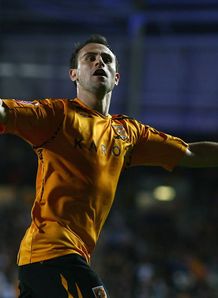














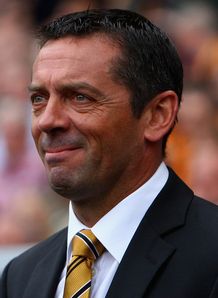




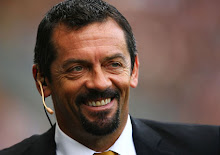

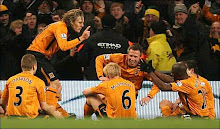.jpg)
